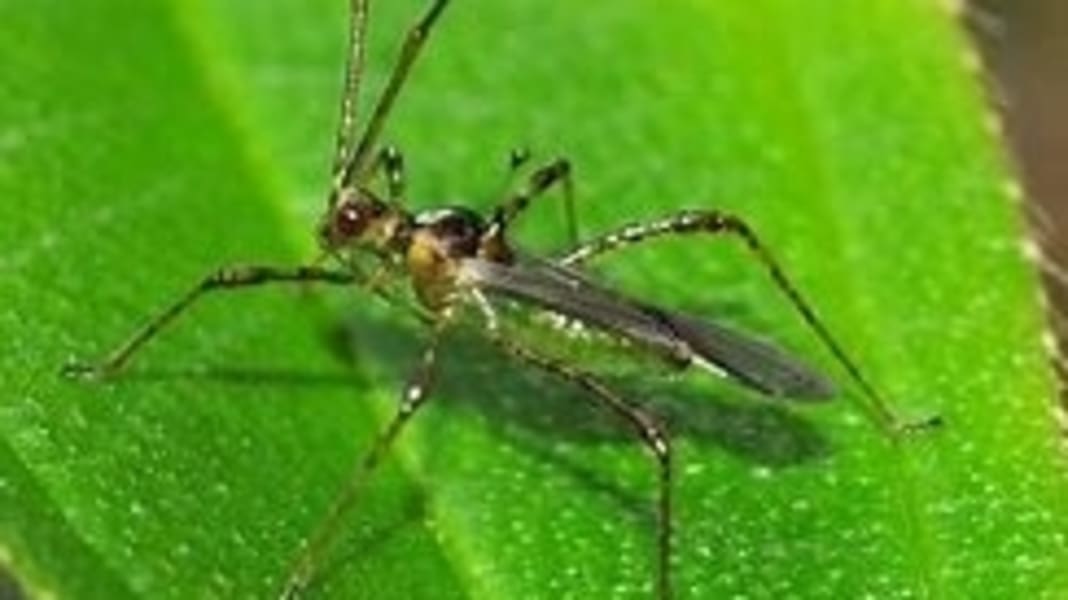-Roopak Goswami
Guwahati, June 23: The tea mosquito bug, Helopeltis theivora (TMB), is one of the major pests of tea plantations in India, causing economic losses to the tune of 25–50%. This pest is prevalent in over 80% of the tea growing regions of India. In case of severe infestation, it can lead to complete crop loss if not managed effectively.
The tea mosquito bug, Helopeltis theivora , is a primary pest of tea in many regions of the world, including Southeast Asia, Australia, and Africa.

Various sources highlight the destructive nature of H. theivora , which includes feeding on the sap of tender leaves, buds, and young shoots, which are an economically valuable harvest of the tea plant. Furthermore, the process of egg-laying leads to stem cracking and excessive callusing. This in turn hinders growth and cause dying back of the stem.
In recent years, TMB management in the Assam and West Bengal regions have been facing challenges due to the failure of recommended insecticides to deliver the desired control levels. A recent study conducted by a team of scientists from the Tocklai Tea Research Institute (TRA) has revealed that H. theivora has developed resistance against the insecticides like thiamethoxam and deltamethrin in some areas of eastern Indian tea plantations.

The team of scientists were Rupjyoti Das, Somnath Roy( Puincipal Investigator), Gautam Handique, Dipankar Chakraborti , Sudipta Naskar, Kaushik Chakraborty, and Azariah Babu.
A study Decoding Defenses: Biochemical Insights into Insecticide Resistance in Tea Mosquito Bug, Helopeltis theivora from Tea Plantations in Eastern India published in Crop Protection journal says the eastern region, particularly in the Dooars of West Bengal, and Upper Assam, has shown alarming levels of development of resistance, particularly to thiamethoxam (neonicotinoids) and deltamethrin (pyrethroids), two widely used insecticides. The study covered major tea-growing regions of eastern India, including Assam, Tripura, and West Bengal, with over 50 gardens.
“Tea growers are finding their usual pest control methods increasingly ineffective at the recommended doses” the study said.

The use of chemical insecticides is widely recognized as a crucial element in the management strategy for H. theivora. According to the Plant Protection Code established by the Tea Board, Government of India, three categories of insecticides, namely organophosphates, pyrethroids, and neonicotinoids, are allowed to be used in tea to combat H. theivora.
“In recent years, the management of H. theivora in tea plantations of Assam has been a frustrating experience as the recommended insecticides failed to deliver the desired level of control. This scenario becomes even more concerning as increasing reports from tea growers show a decline in the effectiveness of control with recommended insecticides. The use of the same actives over and over again across zones without rotation is known to facilitate resistance development. The evolution of insecticide resistance in insect pests is a complex process that is dependent on a number of factors,” the study says.
Advertisement
The paper highlights a strong correlation between enzyme activity and resistance levels, offering critical insights for improving pest management strategies. By employing synergists that inhibit these detoxifying enzymes, the researchers demonstrate enhanced insecticide toxicity, paving the way for more effective and sustainable pest control methods in tea plantations.
WAY OUT: Director of Tocklai Tea Research Institute Dr. A. Babu and team of scientists (Entomologist) who are associated with the paper said rotational use of insecticides which comprises of avoiding repeated use of the same insecticide class and rotating insecticides with different modes of action could help prevent resistance buildup.
“Adoption of Integrated Pest Management which involves combining chemical control with other management practices such as biological control, cultural practices, and mechanical removal is another way out,” scientists associated with the study said.
Read: NCPCR raises concern over 364 HIV-infected children in Meghalaya
WATCH:
Find latest news from every corner of Northeast India at hubnetwork.in, your online source for breaking news, video coverage.
Also, Follow us on-
Twitter-twitter.com/nemediahub
Youtube channel- www.youtube.com/@NortheastMediaHub2020
Instagram- www.instagram.com/ne_media_hub





